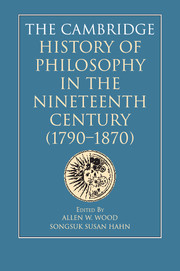Book contents
- Frontmatter
- Contents
- Contributors
- Preface
- Abbreviations
- Introduction
- I Philosophy in the Nineteenth Century
- II Logic and Mathematics
- III Nature
- IV Mind, Language, and Culture
- 8 Psychology
- 9 Language
- 10 The Emergence of the Human Sciences from the Moral Sciences
- 11 The Beautiful and the Good
- V Ethics
- VI Religion
- VII Society
- VIII History
- References
- Index
- References
10 - The Emergence of the Human Sciences from the Moral Sciences
from IV - Mind, Language, and Culture
Published online by Cambridge University Press: 05 December 2012
- Frontmatter
- Contents
- Contributors
- Preface
- Abbreviations
- Introduction
- I Philosophy in the Nineteenth Century
- II Logic and Mathematics
- III Nature
- IV Mind, Language, and Culture
- 8 Psychology
- 9 Language
- 10 The Emergence of the Human Sciences from the Moral Sciences
- 11 The Beautiful and the Good
- V Ethics
- VI Religion
- VII Society
- VIII History
- References
- Index
- References
Summary
As edifying as the aims of the moral sciences may have been, their scientific status was often held to be deficient. Thus David Hume wrote in 1748 in An Inquiry Concerning Human Understanding that the “great advantage of the mathematical sciences above the moral consists in this, that the ideas of the former, being sensible, are always clear and determinate….” Moral ideas like freedom are often obscure and ambiguous. Thus two people agreeing that freedom is a good thing may have very different interpretations of what the term means and what kind of behavior exhibits it. Accordingly, Hume argues that moral reasoning is not in a position to ascertain determinate relations of ideas as are the mathematical sciences. Being about matters of fact and our sentiments toward them, the moral sciences cannot be demonstrative and are merely “experimental,” by which he means that they arrive at “general maxims from a comparison of particular instances.” Moral reasoning cannot expect to arrive at the kind of certainty and universal agreement that the mathematical sciences can produce. Moral certainty is probabilistic at best. According to Hume, “morals and criticism are not so properly objects of the understanding as of taste and sentiment.”
- Type
- Chapter
- Information
- Publisher: Cambridge University PressPrint publication year: 2012
References
- 6
- Cited by

